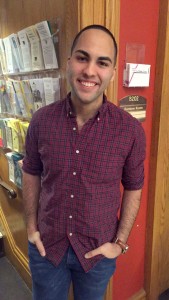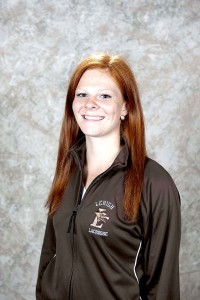
Senior Jonathan Jean-Pierre was a member of the men’s rowing team for a year and a half. he said that as an athlete, his teammates and coaches lacked exposure to the LGBT community and could not provide full support for him. (Raven Atkins/B&W photo)
According to a study published in the Pacific Sociological Association, the masculinity and heteronormativity of modern sports create an environment that can be uncomfortable for LGBT athletes because of the use of homophobic language, lack of support and lack of awareness of the LGBT community.
While wrestling in high school and at the University of Maryland, Hudson Taylor, the founder of Athlete Ally, noticed demeaning humor and homophobic language was used commonly in sports. After college, Taylor launched Athlete Ally, a nonprofit organization that provides public awareness campaigns, educational programming and resources to foster inclusive sports communities around the country.
Lehigh University founded its own Athlete Ally chapter in Spring 2014. Senior Abby Farrell is Lehigh’s Athlete Ally leader and an athlete on the women’s tennis team. Farrell said the lack of awareness of LGBT issues is what struck her at Lehigh. She said when she came to Lehigh, she didn’t know a single member of the LGBT community on the campus for a long time. Starting Athlete Ally in Spring 2014, she began a conversation of inclusion and support for potential gay or transgender athletes at Lehigh.
Due to the increased awareness of the LGBT community and their issues around campus, Lehigh’s athletic programs have taken steps to create more inclusive environments for athletes with non-normative sexual orientations or gender identities. Athlete Ally and athletic leadership programs have opened a discussion about LGBT issues and general inclusiveness of other cultures.
“Today, I think most people are more cautious of the language they use and are aware enough to support the LGBT community,” Farrell said.
Women’s lacrosse sophomore Taylor Tvedt has been openly gay since her sophomore year of high school. Outside of athletics, Tvedt struggled with anxiety because of discrimination against her, such as cyberbullying in high school that was rooted in her sexuality. After coming out in high school, teammates and coaches were supportive of her identity, but Tvedt said that she faced discrimination and unequal treatment outside of her team. For example, parents would worry about what went on in the locker room because there was a lesbian on the team.
Before she came out as a lesbian, Tvedt said it bothered her when she heard teammates use homophobic language, but she was not comfortable bringing attention to herself by explaining how certain terms can offend people. Once she was out as gay, she said she began to clarify with others that some of the terms are offensive because of the negative connotation of the phrase, and people generally learned to understand the pain certain words can cause to people.
Senior Jonathan Jean-Pierre was part of the men’s rowing team for a one-and-a-half years after previously wrestling for four years in high school. After his first semester of his first year at Lehigh, Jean-Pierre came out as gay. He said before coming out, finding his own identity was a nerve-wracking process because he didn’t feel that he had anyone to talk to or understand him. It took time at home looking at other people’s coming out stories on the Internet to begin to come to terms publicly with his sexuality.
“I didn’t feel like the coaches were adequately trained to have these conversations with me,” Jean-Pierre said. “Lehigh at the time wasn’t as diverse as now, based on the number of programs and faculty services to help get through that transitional process. I felt like I had create some kind of facade to appear normal to other people because if I became too close to others when they questioned my sexuality, which would make me feel uncomfortable so I would distance myself.”
Because he participated in athletics at Lehigh, Jean-Pierre said that people accepted his sexual orientation, but didn’t know how to address his needs. After coming out, Jean-Pierre tried to distinguish his own identity, but he said the support wasn’t there because his teammates and coaches didn’t know how to support him at the time because they lacked the exposure to the LGBT community. Jean-Pierre said that there are still problems with people in Lehigh’s athletic community with doubting an individual’s character or performance based off of misconceptions of what it means to be gay, such as a gay male being attracted to the other males in the locker room.
Julie Ammary does leadership education for Lehigh’s athletic department. She said her focus is building leaders to help bring a community-wide effort to make a more inclusive and respectful community.
“It is important to feel like they have community that supports them in identifying who they are,” Ammary said. “I think it’s important that people learn the skill of being able to put themselves in someone else’s shoes or being able to hear other people’s perspectives.”
Tvedt said her teammates were more supportive of her sexuality because the Lehigh’s women’s lacrosse team is so close to each other and everyone has their own variety of other ethnic, religious and socioeconomic backgrounds, which makes for a more inclusive atmosphere. While her own team has been fully supportive, she said that other Lehigh athletic teams don’t have the awareness and experience of a gay athlete on their team so other athletes in Lehigh’s community avoid talking about the subject.

Sophomore Taylor Tvedt has started at goalie for wome’s lacrosse in 16 out of 17 games. for the 2015 season. Tvedt said her team has been very supportive, but this might not be the case for other sports teams. (Courtesy of Lehigh Sports)
Taylor said the underlying problem with homophobia and transphobia in sports is the construction of sports because it is one of the few institutions that is still segregated by gender. As a result, the opposite of something perceived as masculine is considered feminine, so, for a male to insult or make fun of teammate, an athlete uses a sexist or homophobic slur to associate the target with femininity. A female athlete, in a similar way, would use comments that associate the target with masculinity.
As an example of segregation in athletics, Taylor said, in gymnastics, women’s floor competes to music while men’s floor does not. In a similar way, Tvedt said, in women’s lacrosse, they have less protection for contact because women don’t get the same boundaries and levels of physical contact as men’s lacrosse does. Taylor said that these aspects of the sports are arbitrary and rooted in gender norms by feminizing female athletes and masculinizing male athletes. Taylor said that he thinks Lehigh should do more vocal and visual support for the LGBT community so that in the closet athletes know they are in a safe environment.
“I think there can be reasons to bring the sports together like girls and boys lacrosse,” Tvedt said. “Combining them more for the social aspect could always improve the environment of both teams. I think it is important that everyone knows that it’s okay to be different and have differences between girls and guys, but, in the end, everyone needs to get along to be successful as a team.”
While Jean-Pierre has faced homophobia in all aspects of his life, he is also half African American and half Latino. Growing up in New York City public schools, Jean-Pierre said an individual had to act masculine to appear straight, as to not put oneself in danger. He said that everyone has many different things they identify with and that people are not defined by their ethnicity or sexual orientation, so meeting the comfort needs of an individual is an overall issue of inclusiveness.
“I think it’s important for coaches to be aware that their team can consist of many different backgrounds and to form a relationship with their team regardless of sexual orientation or gender identity,” Farrell said.
Ammary said the athletic department tries to engage meaningful dialogue as often as possible, which includes people inside and outside Lehigh’s athletic community. Taylor said not being able to be themselves fully can limit their performance in all aspects of life.
“The strongest teams and the teams that will get the most championships are the ones where everyone feels like they can be themselves,” Farrell said.





Comment policy
Comments posted to The Brown and White website are reviewed by a moderator before being approved. Incendiary speech or harassing language, including comments targeted at individuals, may be deemed unacceptable and not published. Spam and other soliciting will also be declined.
The Brown and White also reserves the right to not publish entirely anonymous comments.